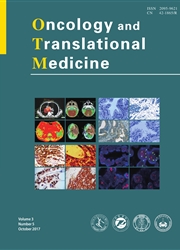

 中文摘要:
中文摘要:
客观:由经蝶骨外科探索尖锐垂体卒中和它的效果的垂体功能。方法:临床的数据和有尖锐垂体卒中的 25patients 的内分泌的荷尔蒙水平从 2002 年 1 月经历了经蝶骨外科到 June2004 的人,回顾地被分析。结果:13 个盒子在 1 个星期以内在承认和 22 个盒子以后在 3 天以内经历了外科。25 个盒子, 9 个病人在外科前承受了缺陷 ofpituitary-thyroidal 功能,垂体肾的功能的 14 个盒子和 11 盒子 ofpituitary-gonadal 功能。在外科以后, 5/9, 8/14 和 7/11 从相应垂体机能减退被恢复。结论:垂体机能减退是尖锐垂体卒中的主要表明。迫切外科解压缩贡献了垂体功能的改进。有在外科以后的垂体机能减退的病人要求了相应荷尔蒙代替治疗。
 英文摘要:
英文摘要:
Objective: To explore the pituitary function of acute pituitary apoplexy and its effect by transsphenoidal surgery. Methods: The clinical data and endocrine hormones level of 25 patients with acute pituitary apoplexy who underwent transsphenoidal surgery from Jan. 2002 to June 2004 were retrospectively analyzed. Results: 13 cases underwent surgery within 3 days after admission and 22 cases within 1 week. Of the 25 cases, 9 patients suffered the impairment of pituitary-thyroidal function, 14 cases of pituitary-adrenal function and 11 cases of pituitary-gonadal function before surgery. After surgery, 5/9, 8/14 and 7/11 were recovered from the corresponding hypopituitarism. Conclusion: Hypopituitarism is a major manifestation of acute pituitary apoplexy. Urgent surgery decompression contributed to the improvement of pituitary function. Patients with hypopituitarism after surgery required the corresponding hormones replacement therapy.
 同期刊论文项目
同期刊论文项目
 同项目期刊论文
同项目期刊论文
 期刊信息
期刊信息
